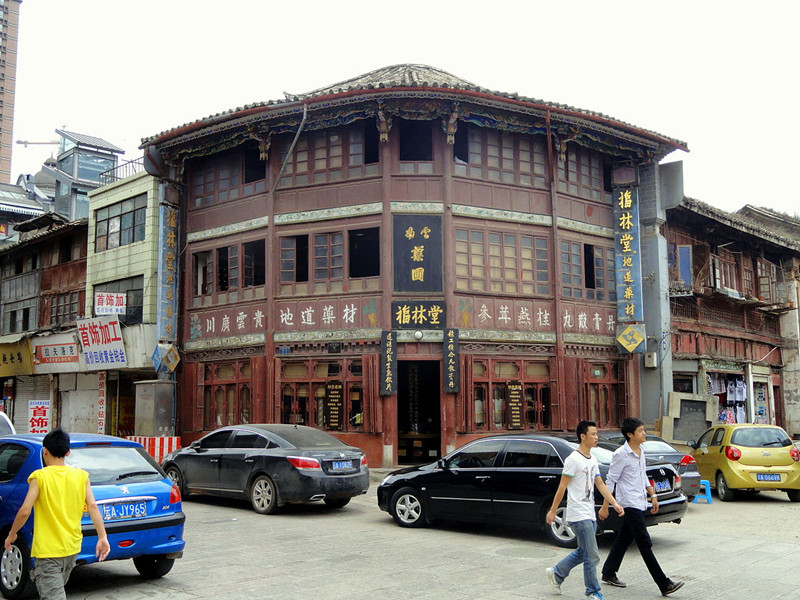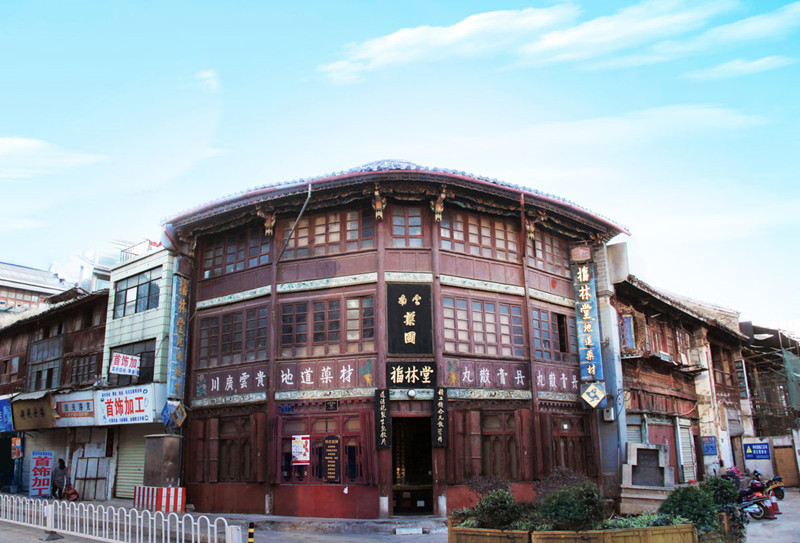
Site of Fulintang in Kunming
Introduction
Fulintang (福林堂), located at No. 31, Guanghua Street, Wuhua District, Kunming City, Yunnan Province, is one of the oldest surviving pharmacies in Yunnan, originally established in 1857. Covering an area of about 210.4 square meters with a building area of approximately 464.3 square meters, Fulintang consists of a shop, staircase, and medical rooms. The pharmacy, shaped by its unique pharmaceutical craft, stands as a significant representation of traditional Chinese medicine culture in Yunnan.
In 1990, Fulintang’s old store on Guanghua Street was designated as a “Key Cultural Relic Protection Unit” by the People’s Government of Panlong District, Kunming City. In May 2003, the same store was declared as a fourth-batch city-level cultural relic protection unit by the People’s Government of Kunming City. On March 5, 2013, the State Council of the People’s Republic of China listed Fulintang as a national key cultural relic protection unit.
Location and Transportation
Fulintang is located at No. 31, Guanghua Street, Wuhua District, Kunming City (云南省昆明市五华区光华街31号). The site is approximately 28.5 kilometers from the Kunming Municipal Government, and it takes around 57 minutes to drive there.
Historical Evolution
Fulintang has undergone three major development stages:
- 1857 to 1956: The pharmacy was known as Li Family Fulintang (李氏福林堂), founded by Li Yuqing (李玉卿).
- 1956 to 1999: After public-private partnerships, it became State-owned Fulintang (国有福林堂), merging with over 200 small and medium-sized pharmacies in Kunming to form the Kunming Pharmaceutical Company.
- 1999 to Present: Fulintang transformed into a joint venture, marking the beginning of its expansion and modernization.
During the late Qing Dynasty in 1857, Li Yuqing established Fulintang on Guanghua Street. By the time of the Republic of China, the pharmacy had expanded its scope, selling both medicinal herbs and prepared medicines, with famous doctors providing consultations on-site. The pharmacy gained a strong reputation for its quality herbs, comprehensive selection, and outstanding efficacy, becoming one of the most renowned traditional Chinese medicine shops in Kunming.
In 1999, Fulintang was approved as Yunnan’s first pharmaceutical chain pilot enterprise by the Yunnan Provincial Economic and Trade Commission. By 2007, the Fulintang chain had grown to over 150 stores, not only in Kunming but also expanding into other regions, including Guizhou and East China. Fulintang, a century-old Yunnan brand, successfully ventured beyond the red earth plateau.
In 2021, the cultural relics department of Wuhua District initiated a protection and restoration project for Fulintang.
Architectural Layout
Fulintang’s structure is composed of a shop at the street intersection, a staircase, and medical rooms. The shop is fan-shaped, built in accordance with the street layout. The staircase and medical rooms are connected to the east, forming a straight line in their plan. The shop features an eight-sided roof, typical of the three-story wooden structures in Kunming’s traditional corner buildings. The total area of the property is about 210.4 square meters, with a total construction area of approximately 464.3 square meters.
The attached buildings are connected to the east gable of the main building and include a three-story staircase and two-story medical rooms. The total construction area of these structures is about 250 square meters, all adopting a brick-wood structure with traditional Kunming architectural features.
Ground Floor
The first floor houses the reception area and the pharmacy. The walls are decorated with advertisements that read: “Famous doctors write good prescriptions, famous stores dispense good medicine.” Photos of famous doctors and staff members are also displayed.
Second Floor
The second floor contains consultation rooms named after famous doctors such as Shizhen (时珍) and Simiao (思邈), where patients receive treatment. The walls feature the four traditional diagnostic methods of Chinese medicine: “Inspection (望), Smell (闻), Inquiry (问), and Palpation (切).” Nearby is the medicine dispensing hall for patients.
Third Floor
The third floor is used as a medicine warehouse, with restricted access to unauthorized personnel.
Main Building Features
Shop
The shop, fan-shaped with an eight-sided wind-resistant roof, is a three-story wooden structure typical of brick-wood corner buildings. The roof is a single-eave green-tile top, with two intersecting ridges that meet at a right angle, forming a characteristic “umbrella” shape. The central support pillar, known as the “umbrella handle,” holds the main load-bearing beams. This innovative design maximizes interior space.
Staircase and Medical Rooms
The staircase area connects to the medical rooms. The medical rooms consist of five bays with an overhanging second-floor gallery supported by carved columns. The buildings maintain the traditional green-tiled gable roofs and are characteristic of Kunming’s local architectural style.
Cultural Significance
The Name “Fulintang”
The name “Fulintang” (福林堂) is inspired by the legend of Dong Feng (董奉), a famous doctor from the Three Kingdoms period who treated the poor without charging a fee. Instead, cured patients would plant apricot trees in his courtyard. Over time, his courtyard became a flourishing apricot forest, symbolizing the benevolence of medical practice. Li Yuqing named the pharmacy “Fulintang,” meaning “a blessed apricot forest,” to honor Dong Feng’s virtuous deeds.
Traditional Chinese Medicine Craftsmanship
Fulintang is renowned for its adherence to the traditional Chinese medicine processing techniques outlined in the pharmacy’s motto: “Prepare decoction pieces according to the law, and skillfully combine them into pills, powders, and plasters.” The pharmacy prioritizes quality, craftsmanship, and the efficacy of its medicines, and the experienced staff are knowledgeable in the four natures of medicine: cold, heat, warmth, and coolness, as well as the five flavors: pungent, sweet, sour, bitter, and salty. These skills, along with precise weighing methods, have made Fulintang a representative of Yunnan’s traditional Chinese medicine culture.
Honors and Recognition
In 1990, Fulintang’s old store was designated as a cultural relic protection unit by the People’s Government of Panlong District. In May 2003, it was recognized as a fourth-batch city-level cultural relic protection unit. On March 5, 2013, the State Council of the People’s Republic of China listed Fulintang as a national key cultural relic protection unit.
In 1994, Fulintang was awarded the title of “China Time-honored Brand” by the Ministry of Domestic Trade.
Tourist Information
- Location: Fulintang is located at No. 31, Guanghua Street, Wuhua District, Kunming City (云南省昆明市五华区光华街31号).
- Transport: The site is approximately 28.5 kilometers from the Kunming Municipal Government, about a 57-minute drive.



 7 Days GolfingTour
7 Days GolfingTour
 8 Days Group Tour
8 Days Group Tour
 8 Days Yunnan Tour
8 Days Yunnan Tour
 7 Days Shangri La Hiking
7 Days Shangri La Hiking
 11 Days Yunnan Tour
11 Days Yunnan Tour
 6 Days Yuanyang Terraces
6 Days Yuanyang Terraces
 11 Days Yunnan Tour
11 Days Yunnan Tour
 8 Days South Yunnan
8 Days South Yunnan
 7 Days Tea Tour
7 Days Tea Tour
 8 Days Muslim Tour
8 Days Muslim Tour
 12 Days Self-Driving
12 Days Self-Driving
 4 Days Haba Climbing
4 Days Haba Climbing
 Tiger Leaping Gorge
Tiger Leaping Gorge
 Stone Forest
Stone Forest
 Yunnan-Tibet
Yunnan-Tibet
 Hani Rice Terraces
Hani Rice Terraces
 Kunming
Kunming
 Lijiang
Lijiang
 Shangri-la
Shangri-la
 Dali
Dali
 XishuangBanna
XishuangBanna
 Honghe
Honghe
 Kunming
Kunming
 Lijiang
Lijiang
 Shangri-la
Shangri-la
 Yuanyang Rice Terraces
Yuanyang Rice Terraces
 Nujiang
Nujiang
 XishuangBanna
XishuangBanna
 Spring City Golf
Spring City Golf
 Snow Mountain Golf
Snow Mountain Golf
 Stone Mountain Golf
Stone Mountain Golf



















